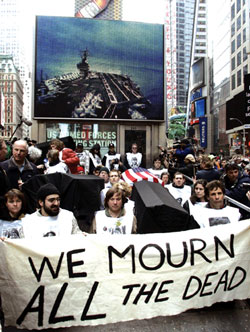George W. Bush; A dangerous president (FCN, 02-01-2005)

NEW YORK (FinalCall.com) – The energy and spirit of the American anti-war movement is very high, according to Leslie Cagan, national coordinator of United for Peace and Justice (UFPJ), a coalition of 1,200 groups and organizations. Observers credit UFPJ with organizing three of the largest demonstrations in the United States against the war in Iraq.
“There is a lot of work left to do; this war is far from over. Each day more and more people are speaking out against the war and I think that energizes anti-war activists. When your movement is growing, and more and more people are joining what you are saying, that energizes you,” Ms. Cagan noted.
On Dec. 6, anti-war activists, led by UFPJ, staged a national “Congressional Call-In Day.” In a Nov. 30 press release, Ms. Cagan explained the reason for the call-in: “New voices are being heard in Congress, mainstream media outlets are asking questions, even military people are saying it is time to end the war. As we keep the pressure on the Bush administration, we need to expand our efforts aimed at Congress.”
During a Dec. 7 telephone interview, she said that it was difficult to assess the success of the call-in effort, but there were reports that a lot of calls were made to Washington. “They (Congress) heard from us,” Ms. Cagan stressed.
Pundits had acclaimed Sept. 24–when 200,000 people turned out in Washington, D.C. to voice their opposition to the Iraq war, as the event that marked the moment when the anti-war movement was finally making itself heard. But, there were also critics who asked why the anti-war movement was not having a greater effect in stopping the war.
Madelyn Hoffman, director of the New Jersey Peace Action group, doesn’t agree with those who say the anti-war movement hasn’t been effective. “We are staging our fifth “Peace Train” anti-war demonstration in Newark on Dec. 3,” stated Ms. Hoffman, “And we see that the sentiment in the nation about the war has changed. The reason that more and more people are calling for an end to the war, and bringing the troops home now, is because of the work of the grassroots anti-war movement.”
She added that the 26 days of protest of Cindy Sheehan [the mother of a U.S. soldier killed in Iraq] sitting in front of President George Bush’s home in Crawford, Texas in the summer “sparked a lot more activity in the streets.”
Ms. Hoffman expressed her belief that Congressman John Murtha (D-Pa.), the ranking member of the House Subcommittee on Defense Appropriations, makes his call in the Congress for the withdrawal of U.S. troops from Iraq; if there had not been pressure from the streets.
Although Rep. Murtha has received the most publicity for his stance, other key elected officials have either spoken out or suggested legislation to help the antiw-ar effort, such as Nebraska Republican Senator Chuck Nagel, a member of the Senate Foreign Relations Committee, who cautioned the Bush administration against demonizing those who oppose their war strategy.
In a Nov. 16, speech before the Council on Foreign Relations in Washington, D.C., Sen. Hagel said, “The Bush administration must understand that each American has a right to question our policies in Iraq and should not be demonized for disagreeing with them.”
Massachusetts Congressman Jim McGovern (D) has introduced a bill HR4232, (The End of Iraq War Act) to prohibit taxpayer funds from U.S. troop deployment in Iraq. “Let’s bring our troops home and restore U.S. credibility in the world community,” Rep. McGovern urged, on the House floor on Oct. 25.
“It’s time to turn up the volume,” insisted Ms. Hoffman, who informed that at least five communities have been holding weekly vigils in New Jersey, since Sept. 21, 2001.
The Newark-based Peoples Organization for Progress understands the need to turn up the volume. The war is a key issue in the Black community these days, according to the group’s director Lawrence Hamm, who says that Blacks are starting to see “clearly” the connections between the anti-war effort and the efforts to stop the conditions that are eroding life in the Black community.
“The irony is that, before we join the Peace Train demonstration, we have to go to Irvington, N.J., to protest the closing of a hospital that serves Black people. Twenty-one hospitals have closed in northern New Jersey in the last five years because there is not enough money–yet we spend $300 million a day for a war,” Mr. Hamm contended, “and we cannot explain why we are in Iraq.”












